- Home
- Thomas Hardy
Jude the Obscure Page 28
Jude the Obscure Read online
Page 28
VI
Meanwhile a middle-aged man was dreaming a dream of great beautyconcerning the writer of the above letter. He was RichardPhillotson, who had recently removed from the mixed village school atLumsdon near Christminster, to undertake a large boys' school in hisnative town of Shaston, which stood on a hill sixty miles to thesouth-west as the crow flies.
A glance at the place and its accessories was almost enough to revealthat the schoolmaster's plans and dreams so long indulged in hadbeen abandoned for some new dream with which neither the Church norliterature had much in common. Essentially an unpractical man, hewas now bent on making and saving money for a practical purpose--thatof keeping a wife, who, if she chose, might conduct one of the girls'schools adjoining his own; for which purpose he had advised her to gointo training, since she would not marry him offhand.
About the time that Jude was removing from Marygreen to Melchester,and entering on adventures at the latter place with Sue, theschoolmaster was settling down in the new school-house at Shaston.All the furniture being fixed, the books shelved, and the nailsdriven, he had begun to sit in his parlour during the dark winternights and re-attempt some of his old studies--one branch ofwhich had included Roman-Britannic antiquities--an unremunerativelabour for a national school-master but a subject, that, after hisabandonment of the university scheme, had interested him as being acomparatively unworked mine; practicable to those who, like himself,had lived in lonely spots where these remains were abundant, and wereseen to compel inferences in startling contrast to accepted views onthe civilization of that time.
A resumption of this investigation was the outward and apparent hobbyof Phillotson at present--his ostensible reason for going alone intofields where causeways, dykes, and tumuli abounded, or shuttinghimself up in his house with a few urns, tiles, and mosaics he hadcollected, instead of calling round upon his new neighbours, who fortheir part had showed themselves willing enough to be friendly withhim. But it was not the real, or the whole, reason, after all.Thus on a particular evening in the month, when it had grown quitelate--to near midnight, indeed--and the light of his lamp, shiningfrom his window at a salient angle of the hill-top town over infinitemiles of valley westward, announced as by words a place and persongiven over to study, he was not exactly studying.
The interior of the room--the books, the furniture, theschoolmaster's loose coat, his attitude at the table, even theflickering of the fire, bespoke the same dignified tale ofundistracted research--more than creditable to a man who had had noadvantages beyond those of his own making. And yet the tale, trueenough till latterly, was not true now. What he was regarding wasnot history. They were historic notes, written in a bold womanlyhand at his dictation some months before, and it was the clericalrendering of word after word that absorbed him.
He presently took from a drawer a carefully tied bundle of letters,few, very few, as correspondence counts nowadays. Each was in itsenvelope just as it had arrived, and the handwriting was of the samewomanly character as the historic notes. He unfolded them one byone and read them musingly. At first sight there seemed in thesesmall documents to be absolutely nothing to muse over. They werestraightforward, frank letters, signed "Sue B--"; just such ones aswould be written during short absences, with no other thought thantheir speedy destruction, and chiefly concerning books in readingand other experiences of a training school, forgotten doubtless bythe writer with the passing of the day of their inditing. In one ofthem--quite a recent note--the young woman said that she had receivedhis considerate letter, and that it was honourable and generous ofhim to say he would not come to see her oftener than she desired (theschool being such an awkward place for callers, and because of herstrong wish that her engagement to him should not be known, which itwould infallibly be if he visited her often). Over these phrases theschool-master pored. What precise shade of satisfaction was to begathered from a woman's gratitude that the man who loved her had notbeen often to see her? The problem occupied him, distracted him.
He opened another drawer, and found therein an envelope, from whichhe drew a photograph of Sue as a child, long before he had known her,standing under trellis-work with a little basket in her hand. Therewas another of her as a young woman, her dark eyes and hair making avery distinct and attractive picture of her, which just disclosed,too, the thoughtfulness that lay behind her lighter moods. It wasa duplicate of the one she had given Jude, and would have given toany man. Phillotson brought it half-way to his lips, but withdrewit in doubt at her perplexing phrases: ultimately kissing thedead pasteboard with all the passionateness, and more than all thedevotion, of a young man of eighteen.
The schoolmaster's was an unhealthy-looking, old-fashioned face,rendered more old-fashioned by his style of shaving. A certaingentlemanliness had been imparted to it by nature, suggesting aninherent wish to do rightly by all. His speech was a little slow,but his tones were sincere enough to make his hesitation no defect.His greying hair was curly, and radiated from a point in the middleof his crown. There were four lines across his forehead, and he onlywore spectacles when reading at night. It was almost certainly arenunciation forced upon him by his academic purpose, rather than adistaste for women, which had hitherto kept him from closing with oneof the sex in matrimony.
Such silent proceedings as those of this evening were repeated manyand oft times when he was not under the eye of the boys, whose quickand penetrating regard would frequently become almost intolerable tothe self-conscious master in his present anxious care for Sue, makinghim, in the grey hours of morning, dread to meet anew the gimletglances, lest they should read what the dream within him was.
He had honourably acquiesced in Sue's announced wish that he wasnot often to visit her at the training school; but at length, hispatience being sorely tried, he set out one Saturday afternoon to payher an unexpected call. There the news of her departure--expulsionas it might almost have been considered--was flashed upon him withoutwarning or mitigation as he stood at the door expecting in a fewminutes to behold her face; and when he turned away he could hardlysee the road before him.
Sue had, in fact, never written a line to her suitor on the subject,although it was fourteen days old. A short reflection told him thatthis proved nothing, a natural delicacy being as ample a reason forsilence as any degree of blameworthiness.
They had informed him at the school where she was living, and havingno immediate anxiety about her comfort, his thoughts took thedirection of a burning indignation against the training schoolcommittee. In his bewilderment Phillotson entered the adjacentcathedral, just now in a direly dismantled state by reason ofthe repairs. He sat down on a block of freestone, regardless ofthe dusty imprint it made on his breeches; and his listless eyesfollowing the movements of the workmen he presently became awarethat the reputed culprit, Sue's lover Jude, was one amongst them.
Jude had never spoken to his former hero since the meeting by themodel of Jerusalem. Having inadvertently witnessed Phillotson'stentative courtship of Sue in the lane there had grown up in theyounger man's mind a curious dislike to think of the elder, to meethim, to communicate in any way with him; and since Phillotson'ssuccess in obtaining at least her promise had become known to Jude,he had frankly recognized that he did not wish to see or hear of hissenior any more, learn anything of his pursuits, or even imagineagain what excellencies might appertain to his character. On thisvery day of the schoolmaster's visit Jude was expecting Sue, as shehad promised; and when therefore he saw the schoolmaster in the naveof the building, saw, moreover, that he was coming to speak to him,he felt no little embarrassment; which Phillotson's own embarrassmentprevented his observing.
Jude joined him, and they both withdrew from the other workmen to thespot where Phillotson had been sitting. Jude offered him a piece ofsackcloth for a cushion, and told him it was dangerous to sit on thebare block.
"Yes; yes," said Phillotson abstractedly, as he reseated himself, hiseyes resting on the ground as if he were trying to remember where he
was. "I won't keep you long. It was merely that I have heard thatyou have seen my little friend Sue recently. It occurred to me tospeak to you on that account. I merely want to ask--about her."
"I think I know what!" Jude hurriedly said. "About her escapingfrom the training school, and her coming to me?"
"Yes."
"Well"--Jude for a moment felt an unprincipled and fiendish wish toannihilate his rival at all cost. By the exercise of that treacherywhich love for the same woman renders possible to men the mosthonourable in every other relation of life, he could send offPhillotson in agony and defeat by saying that the scandal was true,and that Sue had irretrievably committed herself with him. But hisaction did not respond for a moment to his animal instinct; and whathe said was, "I am glad of your kindness in coming to talk plainly tome about it. You know what they say?--that I ought to marry her."
"What!"
"And I wish with all my soul I could!"
Phillotson trembled, and his naturally pale face acquired acorpselike sharpness in its lines. "I had no idea that it was ofthis nature! God forbid!"
"No, no!" said Jude aghast. "I thought you understood? I mean thatwere I in a position to marry her, or someone, and settle down,instead of living in lodgings here and there, I should be glad!"
What he had really meant was simply that he loved her.
"But--since this painful matter has been opened up--what reallyhappened?" asked Phillotson, with the firmness of a man who felt thata sharp smart now was better than a long agony of suspense hereafter."Cases arise, and this is one, when even ungenerous questions must beput to make false assumptions impossible, and to kill scandal."
Jude explained readily; giving the whole series of adventures,including the night at the shepherd's, her wet arrival at hislodging, her indisposition from her immersion, their vigil ofdiscussion, and his seeing her off next morning.
"Well now," said Phillotson at the conclusion, "I take it as yourfinal word, and I know I can believe you, that the suspicion whichled to her rustication is an absolutely baseless one?"
"It is," said Jude solemnly. "Absolutely. So help me God!"
The schoolmaster rose. Each of the twain felt that the interviewcould not comfortably merge in a friendly discussion of their recentexperiences, after the manner of friends; and when Jude had taken himround, and shown him some features of the renovation which the oldcathedral was undergoing, Phillotson bade the young man good-day andwent away.
This visit took place about eleven o'clock in the morning; but no Sueappeared. When Jude went to his dinner at one he saw his belovedahead of him in the street leading up from the North Gate, walkingas if no way looking for him. Speedily overtaking her he remarkedthat he had asked her to come to him at the cathedral, and she hadpromised.
"I have been to get my things from the college," she said--anobservation which he was expected to take as an answer, though it wasnot one. Finding her to be in this evasive mood he felt inclined togive her the information so long withheld.
"You have not seen Mr. Phillotson to-day?" he ventured to inquire.
"I have not. But I am not going to be cross-examined about him; andif you ask anything more I won't answer!"
"It is very odd that--" He stopped, regarding her.
"What?"
"That you are often not so nice in your real presence as you are inyour letters!"
"Does it really seem so to you?" said she, smiling with quickcuriosity. "Well, that's strange; but I feel just the same aboutyou, Jude. When you are gone away I seem such a coldhearted--"
As she knew his sentiment towards her Jude saw that they were gettingupon dangerous ground. It was now, he thought, that he must speak asan honest man.
But he did not speak, and she continued: "It was that which made mewrite and say--I didn't mind your loving me--if you wanted to, much!"
The exultation he might have felt at what that implied, or seemed toimply, was nullified by his intention, and he rested rigid till hebegan: "I have never told you--"
"Yes you have," murmured she.
"I mean, I have never told you my history--all of it."
"But I guess it. I know nearly."
Jude looked up. Could she possibly know of that morning performanceof his with Arabella; which in a few months had ceased to be amarriage more completely than by death? He saw that she did not.
"I can't quite tell you here in the street," he went on with a gloomytongue. "And you had better not come to my lodgings. Let us go inhere."
The building by which they stood was the market-house; it was theonly place available; and they entered, the market being over, andthe stalls and areas empty. He would have preferred a more congenialspot, but, as usually happens, in place of a romantic field or solemnaisle for his tale, it was told while they walked up and down over afloor littered with rotten cabbage-leaves, and amid all the usualsqualors of decayed vegetable matter and unsaleable refuse. Hebegan and finished his brief narrative, which merely led up to theinformation that he had married a wife some years earlier, and thathis wife was living still. Almost before her countenance had time tochange she hurried out the words,
"Why didn't you tell me before!"
"I couldn't. It seemed so cruel to tell it."
"To yourself, Jude. So it was better to be cruel to me!"
"No, dear darling!" cried Jude passionately. He tried to take herhand, but she withdrew it. Their old relations of confidence seemedsuddenly to have ended, and the antagonisms of sex to sex were leftwithout any counter-poising predilections. She was his comrade,friend, unconscious sweetheart no longer; and her eyes regarded himin estranged silence.
"I was ashamed of the episode in my life which brought about themarriage," he continued. "I can't explain it precisely now. I couldhave done it if you had taken it differently!"
"But how can I?" she burst out. "Here I have been saying, orwriting, that--that you might love me, or something of thesort!--just out of charity--and all the time--oh, it is perfectlydamnable how things are!" she said, stamping her foot in a nervousquiver.
"You take me wrong, Sue! I never thought you cared for me at all,till quite lately; so I felt it did not matter! Do you care for me,Sue?--you know how I mean?--I don't like 'out of charity' at all!"
It was a question which in the circumstances Sue did not choose toanswer.
"I suppose she--your wife--is--a very pretty woman, even if she'swicked?" she asked quickly.
"She's pretty enough, as far as that goes."
"Prettier than I am, no doubt!"
"You are not the least alike. And I have never seen her foryears... But she's sure to come back--they always do!"
"How strange of you to stay apart from her like this!" said Sue,her trembling lip and lumpy throat belying her irony. "You, such areligious man. How will the demi-gods in your Pantheon--I mean thoselegendary persons you call saints--intercede for you after this?Now if I had done such a thing it would have been different, and notremarkable, for I at least don't regard marriage as a sacrament.Your theories are not so advanced as your practice!"
"Sue, you are terribly cutting when you like to be--a perfectVoltaire! But you must treat me as you will!"
When she saw how wretched he was she softened, and trying to blinkaway her sympathetic tears said with all the winning reproachfulnessof a heart-hurt woman: "Ah--you should have told me before you gaveme that idea that you wanted to be allowed to love me! I had nofeeling before that moment at the railway-station, except--" Foronce Sue was as miserable as he, in her attempts to keep herself freefrom emotion, and her less than half-success.
"Don't cry, dear!" he implored.
"I am--not crying--because I meant to--love you; but because of yourwant of--confidence!"
They were quite screened from the market-square without, and he couldnot help putting out his arm towards her waist. His momentary desirewas the means of her rallying. "No, no!" she said, drawing backstringently, and wiping her eyes. "Of cou
rse not! It would behypocrisy to pretend that it would be meant as from my cousin; and itcan't be in any other way."
They moved on a dozen paces, and she showed herself recovered. Itwas distracting to Jude, and his heart would have ached less had sheappeared anyhow but as she did appear; essentially large-minded andgenerous on reflection, despite a previous exercise of those narrowwomanly humours on impulse that were necessary to give her sex.
"I don't blame you for what you couldn't help," she said, smiling."How should I be so foolish? I do blame you a little bit for nottelling me before. But, after all, it doesn't matter. We shouldhave had to keep apart, you see, even if this had not been in yourlife."
"No, we shouldn't, Sue! This is the only obstacle."
"You forget that I must have loved you, and wanted to be yourwife, even if there had been no obstacle," said Sue, with a gentleseriousness which did not reveal her mind. "And then we are cousins,and it is bad for cousins to marry. And--I am engaged to somebodyelse. As to our going on together as we were going, in a sort offriendly way, the people round us would have made it unable tocontinue. Their views of the relations of man and woman are limited,as is proved by their expelling me from the school. Their philosophyonly recognizes relations based on animal desire. The wide fieldof strong attachment where desire plays, at least, only a secondarypart, is ignored by them--the part of--who is it?--Venus Urania."
Her being able to talk learnedly showed that she was mistress ofherself again; and before they parted she had almost regained hervivacious glance, her reciprocity of tone, her gay manner, and hersecond-thought attitude of critical largeness towards others of herage and sex.
He could speak more freely now. "There were several reasons againstmy telling you rashly. One was what I have said; another, thatit was always impressed upon me that I ought not to marry--thatI belonged to an odd and peculiar family--the wrong breed formarriage."
"Ah--who used to say that to you?"
"My great-aunt. She said it always ended badly with us Fawleys."
"That's strange. My father used to say the same to me!"
They stood possessed by the same thought, ugly enough, even as anassumption: that a union between them, had such been possible, wouldhave meant a terrible intensification of unfitness--two bitters inone dish.
"Oh, but there can't be anything in it!" she said with nervouslightness. "Our family have been unlucky of late years in choosingmates--that's all."
And then they pretended to persuade themselves that all that hadhappened was of no consequence, and that they could still be cousinsand friends and warm correspondents, and have happy genial timeswhen they met, even if they met less frequently than before. Theirparting was in good friendship, and yet Jude's last look into hereyes was tinged with inquiry, for he felt that he did not even nowquite know her mind.

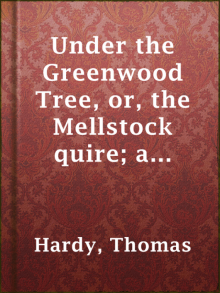 Under the Greenwood Tree; Or, The Mellstock Quire
Under the Greenwood Tree; Or, The Mellstock Quire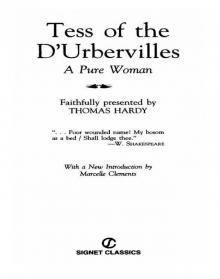 Tess of the D'Urbervilles
Tess of the D'Urbervilles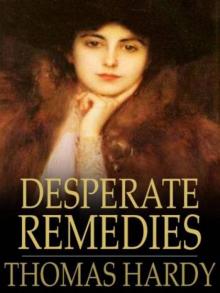 Desperate Remedies
Desperate Remedies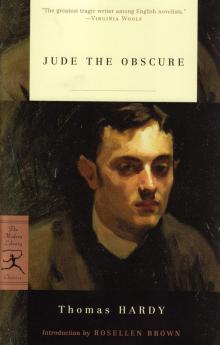 Jude the Obscure
Jude the Obscure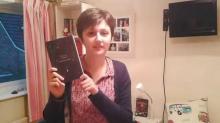 Two on a Tower
Two on a Tower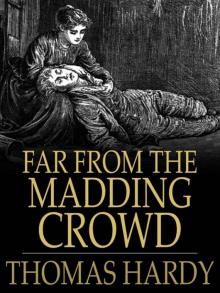 Far from the Madding Crowd
Far from the Madding Crowd The Return of the Native
The Return of the Native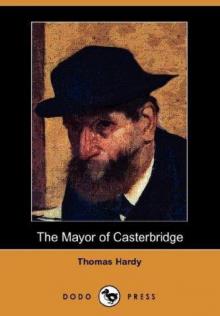 The Mayor of Casterbridge
The Mayor of Casterbridge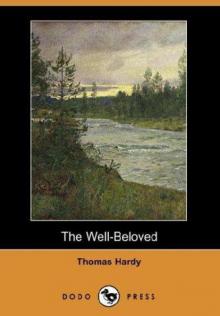 The Well-Beloved
The Well-Beloved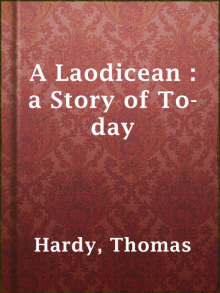 A Laodicean : A Story of To-day
A Laodicean : A Story of To-day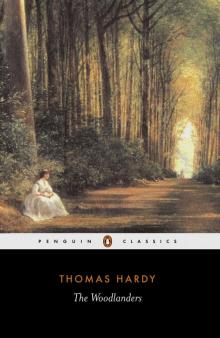 The Woodlanders
The Woodlanders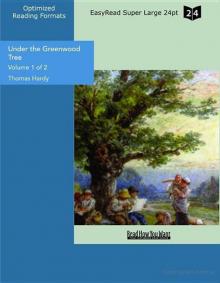 Under the Greenwood Tree
Under the Greenwood Tree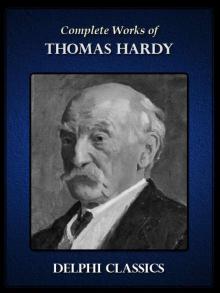 Complete Works of Thomas Hardy (Illustrated)
Complete Works of Thomas Hardy (Illustrated)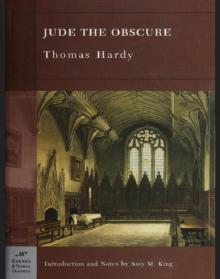 Jude the Obscure (Barnes & Noble Classics Series)
Jude the Obscure (Barnes & Noble Classics Series)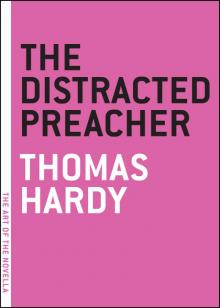 The Distracted Preacher
The Distracted Preacher